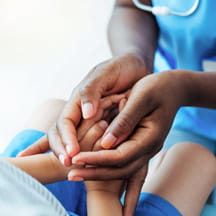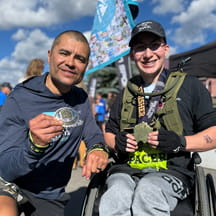Over the past five years, Golisano Children's Hospital of Southwest Florida in Fort Myers has placed an emphasis on expanding access to pediatric behavioral health care in its community. Its efforts have proven fruitful-Golisano Children's increased behavioral health patient visits from just over a thousand in 2017 to an estimated 22,000 in 2020.
Children's Hospitals Today caught up with Armando Llechu, chief administrative officer for Golisano Children's, to discuss how he and his team accomplished the rapid increase in patient visits, the results they're seeing from their efforts and what's next for the hospital on the behavioral health care front.
One of your priorities upon joining Golisano Children's Hospital three years ago was to advance its mission to improve pediatric behavioral health care-what steps have you and your team taken to reach that goal?
We began by discussing what this community needed; we looked at incidents of the Baker Act (a Florida law that enables families and loved ones to provide emergency mental health services for people who are impaired because of their mental illness), what avenues existed for individuals to seek help for substance abuse and eating disorders, and what was happening with follow-up care. We decided the best course of action for us-the architecture of our approach-was to pursue outpatient clinical therapy through psychiatrists, psychologists, licensed mental health counselors and licensed clinical social workers. We set out to build a comprehensive program.
We put together a plan. We looked at the statistics nationally, we applied them to our local population and put together a needs assessment. We also spoke to large groups of providers-pediatricians and other healthcare organizations throughout the community-and asked them what they needed from us to support them from a mental health standpoint. That's really where the journey began.
An important catalyst for that journey has been a philanthropic initiative, Kids' Minds Matter, that has raised more than $10 million since its inception six years ago. What role has it played in expanding access to behavioral health care in your community?
Kids' Minds Matter is a movement aimed at raising awareness, reducing stigma and raising funds to facilitate expansion of mental and behavioral health care services. It has mushroomed into an incredibly amazing force-there isn't another way to describe it..
Some of the things we've done through Kids' Minds Matter include bringing the REACH program to Florida from New York in partnership with Golisano Rochester. It teaches pediatricians how to manage the more basic cases of mental and behavioral health care in their practices so we can free up the pipeline for the psychologists and psychiatrists.
We've also been teaching Mental Health First Aid to incoming freshmen at the local colleges and universities. This helps them look to their peers for how they can watch out for one another. We're helping these individuals: a) have conversations about their mental health challenges, and b) help their friends who may be struggling.
We've also been teaching Mental Health First Aid to parenting groups, caregivers and anyone who spends time with children-it is an awesome program.
How important is reducing stigma to the overall aim of these programs?
The debate is really, is it a stigma or is it a prejudice? Many, many times children go without care for as long as eight to 10 years, either because no one has noticed the symptoms or they haven't spoken of it. Helping a child to recover after 10 years of battling mental health issues is a much heavier lift than helping a child who's just starting to have some of those thoughts. The goal here is to get children into the right type of care provider as early as possible to avoid the devastating long-term effects of this battle.
The more we talk about it, the more families and the community are willing to open up about their struggles, the more we're able to get help for these children. It builds on itself.
You wouldn't hide the fact that your child was diabetic. You wouldn't keep your child from getting care for diabetes or cancer, so why should mental and behavioral health issues be any different? They're not.
What kind of results are you seeing based on these efforts?
We've seen a 38% decrease in year-over-year involuntary admissions to the hospital because of mental or behavioral health issues. Truthfully, it was a bit higher before the pandemic started; we had achieved a 43% decrease, but then the numbers started to climb because of the anxiety associated with the pandemic.
I directly attribute that decrease to the Mental Health First Aid classes, to the increased access for ongoing therapy and the collaboration between us and the mental health providers throughout the community. We have created a continuum of care.
With the expansion of patient visits, do you feel you've reached a critical mass in meeting the behavioral health care needs of your community?
Oh no. I'd say we're just scratching the surface.
We estimate there's somewhere between 40,000 and 60,000 children in our region who need mental and behavioral health care-we've got 22,000 visits available per year. Even if you assume that every child needs only eight visits, we're not even a quarter of the way there.
We continue to recruit, hire and bring therapists here. And we face some of the same challenges others face:
- How much space do you need to accommodate the providers?
- Can we get creative with the scheduling of visits to maximize the space?
- Can we start to open community mental health centers in neighborhoods close to where these children live so they don't have to travel far to get access to therapists?
Those are the things on our roadmap. There's a lot of great people doing a lot of great work and they deserve credit for that, but it really starts with this community and their commitment to what we're doing-their trust and faith in us, and their putting their dollars behind that trust and faith to enable us.


